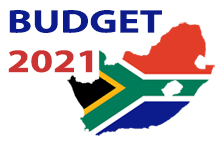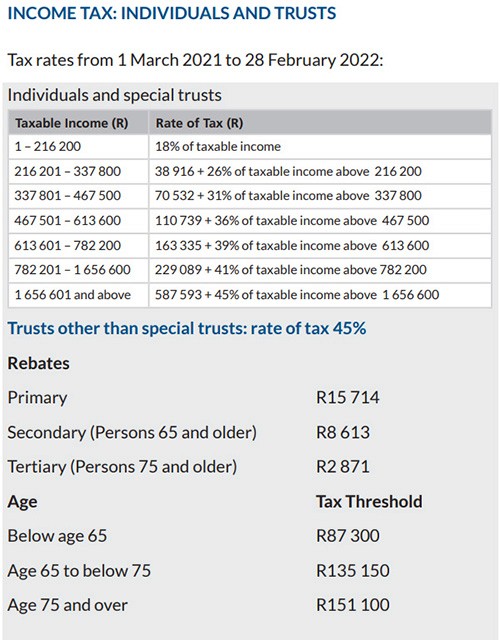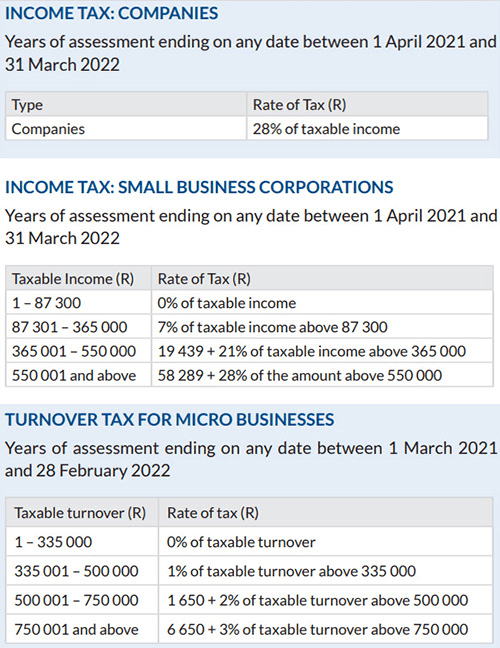March
March
01 Mar 2021
Budget 2021: What It Means to You
“Hope is being able to see that there is light despite all of the darkness.” - Archbishop Emeritus Desmond Tutu

It was with a sense of trepidation that South Africans awaited the 2021 Budget Speech by Finance Minister Tito Mboweni.
Still confronted with all the challenges that existed before COVID-19 – massive debt, lacklustre growth, unemployment, the public service wage bill and rampant corruption – Treasury also faced the seemingly insurmountable challenge of funding the rollout of COVID-19 responses along with muted tax revenue collection impacted by lockdowns, record job losses and business closures.
Reminding South Africans of Archbishop Emeritus Desmond Tutu’s advice that hope is being able to see light despite all the darkness, the Minister presented what has been called a “positive”, “balanced” and “sustainable” framework to address these challenges, announcing some unexpected but welcome short-term tax relief.
The main story: funding COVID-19 responses without tax increases
The two main stories in the 2021 Budget proposals are the funding of the country’s COVID-19 response and the welcome absence of new and/or higher taxes.
Despite talk of a possible ‘vaccine tax’ and new and increased taxes to fund South Africa’s COVID-19 response – including a massive vaccine roll-out that will save lives and support the economic recovery – no new or increased taxes have been introduced to fund vaccines.
Instead, the majority of funding for new and urgent priorities is provided through reprioritisation and reallocation of existing baselines, budget allocations, emergency withdrawals and – if needed – the contingency reserve.
Government has set aside R19.3 billion to fund Covid-19 vaccines, with more than R10 billion allocated for the purchase and delivery of vaccines over the next two years. The contingency reserve has increased from R5 billion to R12 billion for the further purchase of vaccines and other emergencies.
Let’s look at what will change according to the proposals, and what it all means for us on a practical level…
Tax increase proposal withdrawn
In addition to the fact that the Budget review proposals included no new taxes nor any increase in personal and company taxes, government has also withdrawn the proposal announced in the October 2020 Medium Term Budget Policy Statement (MTBPS) to introduce tax measures to raise revenue by R40 billion over the next four years.
This is due to improvements in tax revenue collections in recent months, with tax revenue estimates R99.6 billion higher than projected in October, reducing the tax revenue shortfall to R213 billion.
This will provide welcome relief in the coming year as companies are still reeling from the economic devastation of COVID-19.
Lower corporate tax rate from 2022
It is proposed that the corporate income tax rate will be lowered to 27% for companies with years of assessment commencing on or after 1 April 2022. This is a move in the right direction as SA’s corporate income tax rate at 28% is among the highest in the world. According to Treasury, reducing the rate will have “a positive effect on wages and employment, while promoting additional investment”. The Minister also said that consideration will be given to “further rate decreases to make our tax system more attractive”.
However, this will be accompanied by “a broadening of the corporate income tax base by limiting interest deductions and assessed losses”.
Good news on personal income tax
Personal income tax brackets will be increased by 5%, an above-inflation increase, to provide R2.2 billion in tax relief for lower and middle-income households. This will eliminate “bracket creep”, effectively decreasing personal income tax rates.
It means that if you are earning above the new tax-free threshold of R87,300, you will have at least an extra R756 in your pocket after 1 March 2021.
Government is aiming to reduce the personal income tax rate over time by increasing the tax base through focusing on economic growth which will trigger job creation.
Higher “sin” and other indirect taxes
Unsurprisingly, the excise duties on alcohol and tobacco products were increased by 8% with immediate effect. It means a 750ml bottle of wine will cost an extra 26c while the price of a bottle of 750 ml spirits has increased by R5.50, and a packet of 20 cigarettes will be R1.39 more expensive. Excise duty on electronic nicotine and non-nicotine delivery systems are to be introduced later this year – following public consultations.
From 7 April, the fuel levies will also be increased by 27 cents per litre, comprising 15 cents per litre for the general fuel levy, 11 cents per litre for the Road Accident Fund levy and 1 cent per litre for the carbon fuel levy. This will have a negative effect on the cost of living for South Africans and businesses across all industries.
Other changes
The June 2021 sunset clause for the so-called Section 12J tax breaks was not extended. The tax rebate could be claimed on investments through an approved venture-capital company and was meant to encourage investments in small businesses and riskier ventures that can help to create jobs and economic growth. Some analysts commented that the absence of this attraction offered to venture capital investment companies, will negatively impact job growth in the country.
The UIF contribution ceiling will be set at R17,711.58 per month from 1 March 2021.
An inflationary adjustment to medical tax credits – which will increase from R319 to R332 for the first two members, and from R215 to R224 for all subsequent members.
Financial sector levies – Bill to be tabled early 2021.
The carbon tax rate increased by 5.2%, from R127 to R134 per tonne of carbon dioxide equivalent, along with an increase of 1c to 8cents/l for petrol and 9cents/l for diesel from 7 April 2021, and 12.5cents/bag for bio-based plastic bags.
Taxpayers under greater scrutiny
An additional spending allocation to SARS of R3 billion over the medium term has been requested to fund tax collection efforts. As the Minister warned in his speech: “SARS has started to deepen its technology, data and machine learning capability. It is also expanding specialised audit and investigative skills in the tax and customs areas to renew its focus on the abuse of transfer pricing, tax base erosion and tax crime. In this coming fiscal year, SARS will establish a dedicated unit to improve compliance of individuals with wealth and complex financial arrangements. This first group of taxpayers have been identified and will receive communication during April 2021.”
This means that taxpayers with complex financial arrangements should engage a CA(SA) tax specialist to assist them in preparing and/or reviewing their tax returns prior to submission. Similarly, where SARS have selected a taxpayer for verification or audit, or where penalties and interest have already been imposed and levied, taxpayers will need expert assistance.
Have a look at the Tax Tables and Calculators below for more on how this will all impact on you and your business.
Budget 2021: Your Tax Tables and Tax Calculator

How much will you be paying in income tax, petrol and sin taxes? Use Fin 24’s four-step Budget Calculator here to find out.
Have a look at the tax tables below for the new Individual and Special Trust income tax brackets, and for a convenient reminder of the various other taxes that remain unchanged –

Source: SARS


Source: SARS
3 Survival Tips for Your Small Business In 2021: Little Things with A High Impact
“If we believe that tomorrow will be better, we can bear a hardship today” - Thích Nhất Hạnh

According to a press release issued this year by the World Bank, the pandemic has taken “a heavy toll of deaths and illness, plunged millions into poverty, and may depress economic activity and incomes for a prolonged period”.
World Bank Group President, David Malpass, explained that while the collapse in global economic activity in 2020 due to the onset of the pandemic, is estimated to have been slightly less severe than previously projected in advanced economies overall, for most emerging market and developing economies, the impact was more acute than expected.
“Financial fragilities in many of these countries, as the growth shock impacts vulnerable household and business balance sheets, will also need to be addressed”, added Vice President and World Bank Group Chief Economist, Carmen Reinhart.
It is under these circumstances that businesses are battling to keep their heads above water. Here are four simple things you can do to help your business survive in 2021.
1) Delve into your budget
Now more than ever the small business owner needs to understand their company and the way that company spends money. A budget is a roadmap for small businesses, and in the day-to-day running of a start-up or small enterprise it can often be neglected in favour of making payments if and when they seem necessary.
If you don’t have a budget, make one, and if you have one, take a fresh look at it. Understand what the costs are and where the money is coming from. Know what expenses are coming up down the line – are there licences or new machines you need to own or lease? Do the staff expect a bonus at a specific time of year? Do you need extra at year end for a marketing campaign? Where and how you spend money will show you what’s important to your business and where the fat can be cut. Trimming small amounts from dead areas and focusing that money on the places that deliver returns can make a dramatic difference to the bottom line.
Riley Panko, in a report on budgeting, said, “Businesses of all sizes should create a budget if they don’t want to risk the financial health of their organisation…Businesses may create more challenges for themselves by skipping a budget. This is because budgeting helps small businesses focus.”
Knowing what your long and short terms needs are will help you plan, and streamline your business, which in turn will help you survive 2021.
2) Focus on your core customers, and ditch your “barnacle clients”
In good times it is a good idea to expand your outlook and try to capture new markets for your products. You have the time to focus on those “barnacle clients” who eat up your time and don’t necessarily deliver the same return for time invested. But in tough times, it’s wise to return to key principles and focus on those clients and markets you know work.
Barnacle clients are, according to Joe Woodward, those clients who, “Whine about fees; complain about work quality even when you know it was well done; don’t supply needed information on a timely basis; and aren’t teachable”. Woodward suggests those clients should be jettisoned from a business as they only serve to drag a business down in choppy waters when the company needs to be running as sleekly and efficiently as possible.
“Those kinds of clients should be fired,” he says. “It’s a scary thing, but I have never had anything but a net gain from firing a client.”
At the same time the business owner needs to put the energy that was going into barnacle clients into those who offer returns. Go back to the best clients that you haven’t spoken to in a while, touch base with friends, networks and contacts who you know could benefit from your business, and, in this way, reinvigorate your client base.
Advertising too should start to focus on your core client demographic. Don’t know what that is? Then it’s time to start going through the data. Start with internal data on past customers, and focus on creating a customer profile. This includes basic demographic information, but also try to map your customer on a deeper level. What are their values? What are their spending attitudes? What makes them excited and what makes them tick?
All of this will give you a comprehensive picture of what your core customer demographic looks like. While you may want to market as widely as possible to capture as many customers as possible, this focused kind of marketing will be much more effective, especially for small businesses.
3) Advertise concisely
Repeated studies are finding that people are increasingly jaded, easily distracted and unwilling to engage with advertising – particularly on social media, an important area for the small business. This does not, however, mean that you should stop advertising. On the contrary, social media is still one of the most important tools that a modern business owner can utilise with 52% of new brand discovery happening on public social media feeds. The trick is to be clear, and concise.
According to stats from Instagram, 60% of users report that they have discovered a product on another person’s profile, but this never happens with overly long posts or wordy descriptions. Gone are the days when people would watch a full YouTube advert. If your brand message isn’t in place before the skip button can be pushed, you should consider the money wasted. And the rules of social media should be applied across the board to all other types of marketing be they newsletters, emails or even phone calls.
Luke Lintz from social media agency Highkey suggests business advertising should:
Lead with the product or service,
Make the offer personal to the customer,
Use only a few key statistics to support the claim
Emphasise return on investment
Stay away from “used car” sales language like “Don’t miss out”.
“The key is personalised honest communication that doesn’t eat up the client’s time,” he explains.
Repeated studies also show that getting staff to personally reach out to potential clients works much better than generic adverts.
The Department of Small Business Development’s Lifelines to Suffocating SMMEs
“It’s been said that government doesn’t create jobs, business does. For the most part, this is true. But government creates the environment in which businesses can excel and expand” - American politician and lawyer, Christine Gregoire

There are several resources that the government, under the guidance of the Department of Small Business Development (DSBD), has made available to SMMEs with the objective of assisting them to keep afloat and competitive in this current climate. The programmes below are but a select few.
The department until recently had a COVID-19 Debt Relief Finance Scheme, which unfortunately ceased to exist a couple of months ago. The fund had re-prioritised just over half a billion Rand to assist small businesses during the lockdown stranglehold.
However, the DSBD still has these resources to assist SMMES:
The SMME Business Growth Resilience FacilityIn sport, experts always say “the best form of defense is offense”. The same sentiment applies in business.This resource was set up with the objective of assisting SMMEs in taking advantage of supply opportunities resulting from the COVID-19 pandemic and the shortage of goods in the local market. This includes the likes of PPEs and other COVID-19 fighting measures. This is a “counter attacking” resource that aims to assist small businesses respond to the COVID-19 pandemic, and is a programme that helps cushion them while leaning against the ropes as a result of COVID-19.
According to the department, to qualify:
The business must have been registered with CIPC by at least 28 February 2020.
It must be 100% owned by South African Citizens,
Its staff compliment must be 70% South Africans; among several other qualifying considerations.
The SheTradesZA HubTogether with the DSBD and the Small Enterprise Development Agency (SEDA), the ITC SheTrades has set up a Hub in South Africa, in order to help South African women entrepreneurs, increase their international competitiveness and connect to national, regional and global markets through the SheTradesZA Hub.The primary objective of the Hub is to connect at least 50 000 women owned businesses to markets by 2023. This is part of South Africa’s contribution to ITC’s goal of connecting three million women owned businesses to markets by 2021.
The Black Business Supplier Development Programme (BBSDP)The BBSDP is essentially cost-sharing grants offered to black-owned SMMEs with the aim of sustainably stimulating their competitiveness and creating employment.The objective is to fast-track and stimulate existing SMMEs that exhibit good potential for growth and to grow black-owned enterprises by fostering linkages between black SMMEs and corporate and public sector enterprises, among other objectives.
This programme provides grants of up to R1 million to small businesses that meet the selection criteria.
Research and access to informationThe DSBD has placed various research findings on small businesses, for the benefit of entrepreneurs, on its website. These are expertly done reports on interesting topics like comparisons on the performance and trends of South African SMMEs based on legislation against their peers from other parts of the world. For that report, please click on this link and for the general research resources, please click here.
Ask your accountant how you can take advantage of these resources to give your business an edge.
New National Minimum Wage and Earnings Thresholds From 1 March 2021

(N.B. The increases highlighted below are extracted from the Employment and Labour Minister’s announcement of 9 February 2021, and emphasis has been supplied where helpful in enabling quick identification of your employment sector. Comment is in square brackets)
“The National Minimum Wage (NMW) for each ordinary hour worked has been increased from R20,76 to R21,69 per hour [a 4.5% increase] for the year 2021 with effect from 1 March 2021.
It is illegal and an unfair labour practice for an employer to unilaterally alter hours of work or other conditions of employment in implementing the NMW. The NMW is the amount payable for the ordinary hours of work and does not include payment of allowances (such as transport, tools, food or accommodation) payments in kind (board or lodging), tips, bonuses and gifts.
Following a transitional phase, the farm worker sector has been aligned with the NMW rate of R21,69 per hour [a 16% increase].
The domestic workers sector will be entitled to R19,09 per hour [a 23% increase] and could be expected to be aligned with the NMW when the next review is considered [i.e. 2022]. [Use the Living Wage calculator to check that you are paying your domestic worker enough to cover a household’s “minimal need”].
In line with the Basic Conditions of Employment Act (BCEA), the increase in the NMW will mean that wages prescribed in the sectoral determinations that were higher than the NMW at its promulgation, must be increased proportionally to the adjustment of the national minimum wage. Therefore, the Contract Cleaning; and Wholesale and Retail Sector will also have their wages upwardly adjusted by 4,5 percent.
In another development, the Minister has also, in terms of the BCEA earnings threshold, revised the rate from R205 433.30 to R211 596.30. Chapter 2 of the Act deals with the regulation of working time, limit on the duration of an employee’s working week and to prescribe a rate at which an employee should be paid to work outside normal working hours among others.
Employees that earn in excess of this rate per annum are excluded from sections 9, 10, 11, 12, 13, 14, 15, 16, and 17(2) and 18(3) of this Act from 01 March 2021. These sections protect vulnerable employees and regulate amongst others, hours of work, overtime, compressed working time, average hours of work, meals interval, daily and weekly rest period, pay for work on Sundays, night work, and work on public holidays.”
Your Tax Deadlines for March 2021

5 March – Monthly PAYE submissions and payments
25 March – VAT manual submissions and payments
30 March – Excise Duty payments
31 March – VAT electronic submissions and payments
31 March – Corporate Income Tax Provisional Tax payments where applicable.




